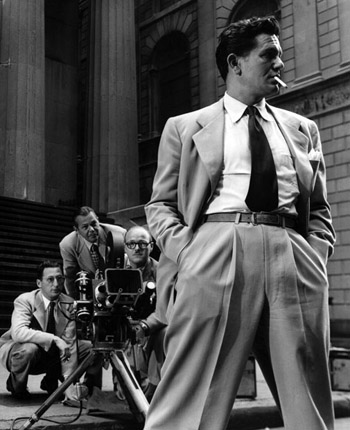
We begin in Los Angeles, where REDCAT’s presenting a special screening on Monday: “Remastered and re-edited 17 years after its original release, Thom Andersen and Noël Burch’s insightful essay film Red Hollywood (1996/2013, digital video, 114 min.) still offers a radically different perspective on a key period in the history of American cinema.” In the Times, Kenneth Turan adds that the film “takes dead aim at the conventional wisdom that says the filmmakers who were blacklisted for Communist Party affiliations were not especially talented and unable to get much political content into their work.”
On Sunday, Filmforum presents three new films by Brigid McCaffrey.
San Francisco. Michael Atkinson at Sundance Now: “Looking at Vasili Zhuravylov’s Cosmic Voyage (1936), as I have courtesy of the good people at the San Francisco Silent Film Festival, which is preparing to show a restored print this year, you come away with the sense of having seen something genuinely otherworldly. Was this thing made on Earth, by humans?”
Seattle. David Schmader in the Stranger: “Now in its 11th year, Trader Joe’s Silent Movie Mondays series is the twice-a-year tradition wherein Seattleites experience classic silent cinema in the most glamorous way possible: with live organ accompaniment from Wurlitzer master Jim Riggs, in the beautiful Paramount Theatre.” This coming Monday brings G.W. Pabst‘s Pandora’s Box (1929) with Louise Brooks.
Chicago. “One seldom thinks of movie exhibitors having an academic agenda, but the Music Box organization has been developing an odd sideline in revisionist history of the European war,” writes the Reader‘s J.R. Jones. Following presentations of Cate Shortland’s Lore and Wladyslaw Pasikowski’s Aftermath, “Music Box Films has acquired U.S. distribution rights for Generation War, a controversial German TV miniseries about five young Berliners pulled apart and then reunited by Hitler’s doomed assault on the Soviet Union.” The trailer:
“Broadcast in Germany as Our Mothers, Our Fathers, Generation War was roundly attacked for sympathizing too much with its attractive, well-meaning protagonists and, more particularly, for portraying Polish resistance fighters as heartlessly anti-Semitic…. Online commentators have called the series a pernicious exercise in moral relativism, an attempt to spread Germany’s guilt around and alleviate the national conscience. Yet as dramas like these remind us, nations don’t have consciences—only individuals do.”
Meanwhile, Jones lists several other screenings happening over he next several days in the Windy City. Let’s add one more: Tomorrow at the Museum of Contemporary Art, Tacita Dean “will speak about her two most recent projects, FILM and JG (2013), the medium of film, and other issues related to her practice.”
London. Derek Jarman‘s “films—and later, his activism—were crucial points of reference in my generation’s struggles to endure and enjoy life,” writes Neil Bartlett in the Guardian. “Even before I had the good fortune to meet him in person, I intuited that here was a true ally, fighting in much the same way as I and my friends and colleagues were to find a way through some very dark times. Looking back at that era across the space of 20 years, I am powerfully aware that it feels irrecoverably like another country. From 1976 to 1994—from the lyrical obscenity of Jarman’s Sebastiane, say, to the hard-won serenity of his Blue—London was a harsh, vivid and violently homophobic place. The imagery and energy of Jarman’s work reflected that…. Jarman took his first steps towards becoming an artist while studying at King’s College London, and this week sees his old haunt kicking off a year-long celebration of his life and work that is going to spread across the city under the banner Jarman2014.”
For news and tips throughout the day every day, follow @KeyframeDaily on Twitter and/or the RSS feed. Get Keyframe Daily in your inbox by signing in at fandor.com/daily.



